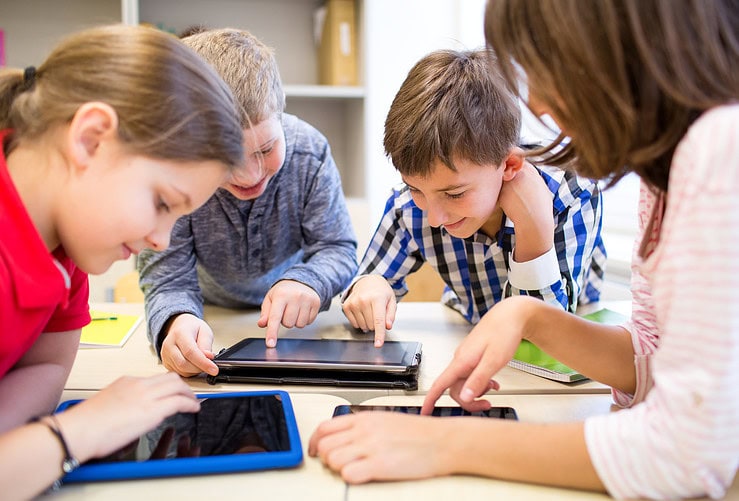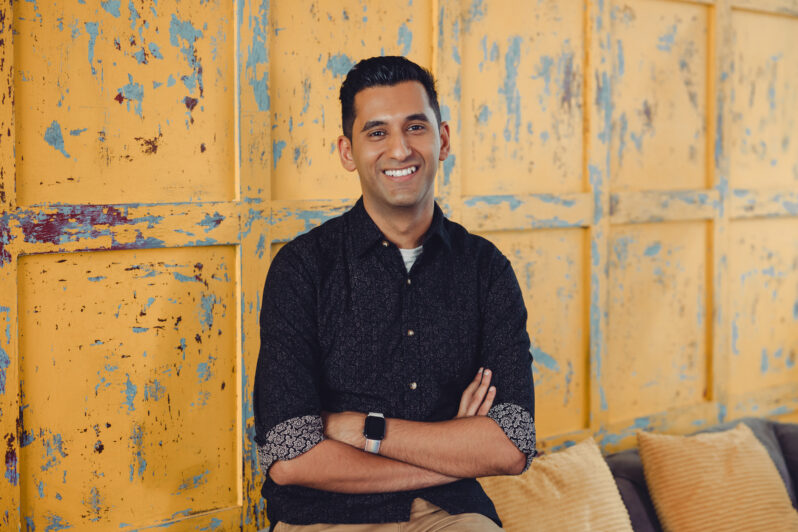Do tablets help or hinder children’s play?
Playing in the digital world can have benefits similar to playing with physical toys

Should we be concerned about the amount of time children spend on digital devices like tablets? What is the impact of these devices on attention and play? Youth development and mental health researcher Kathryn Bates speaks with Salim Hashmi, a researcher on children’s digital play, about making sense of mixed research findings and the potential benefits of collaborative digital play.
KB: What is the focus of your research?
SH: I study children’s play and imagination in the digital world. I became interested in this topic while collecting data as an undergraduate research intern. I noticed that children were really imaginative when playing video games, and that led me to pursue a PhD and then conduct research aimed at understanding play that uses various digital technologies and how it impacts children’s development.
KB: Children’s screen time is a concern for many parents. Is there a link between tablet use and attention in young children?
SH: There is a lot of conflicting evidence. Increased tablet use is linked to poorer attention, but also to better performance with regard to certain types of attention.
These inconsistent results can be explained, in part, by how researchers measure tablet use and attention. Some use simplistic measures like screen time, while others look at how specific apps or programmes are used. There are also a number of different ways to measure attention, which yield different results. For example, “sustained attention” refers to how well a child can pay attention to one thing, whereas “attention shifting” captures how well a child can shift attention from one thing to another. However, researchers use the term “attention” for both.
“Increased tablet use is linked to poorer attention, but also to better performance with regard to certain types of attention.”
Does tablet use undermine attention, have no effect, or boost attention? The answer depends on how the tablet is used and the type of attention we’re measuring. Unfortunately, there’s no clear answer.
KB: Are tablets potentially good for some types of attention and bad for other types? Or is the evidence not robust enough to draw a definitive conclusion, because it is based on small samples or limited in other ways?
SH: Both things are true. It’s difficult to control for everything outside of tablet use that might influence attention– for example, sleep. Tablet use is associated with poorer sleep, and poorer sleep is associated with poorer attention, but sleep is not always accounted for in studies investigating this link.
We want to know whether increased tablet use has an adverse effect on attention. It is difficult to test this premise, and we lack clear evidence. We would need to test the same children over multiple years to understand long-term outcomes. Yet if we started testing a group of young children now and continued into their teenage years, we would probably find at some point that new technologies had made tablets obsolete. Moreover, such testing would be of little use to the teachers and parents who need guidance now.
KB: What have you learnt about tablet use and play?
SH: Lots of research has looked at how educational games or apps promote children’s learning of the curriculum. For example, 16 of 23 studies found a positive link between playing educational games on a tablet and learning outcomes. A whole body of research on Serious Educational Games shows that such games can promote learning, particularly in the sciences.
From my own research, I’ve learnt that when children are with another person, they tend to benefit from playing on a tablet much as they do from playing with traditional or physical toys. When a mother and child play together, either with digital technology or with physical toys, the child learns to think about and understand others.
“When children are with another person, they tend to benefit from playing on a tablet much as they do from playing with traditional or physical toys.”
There is some consistency between physical and digital behaviours in other ways, too. When teachers report that a child is highly pro-social or aggressive in the classroom, we also see this reflected in the child’s video game play. And children use similar types of imaginative language when playing with physical toys and when playing with video games. So children seem to engage in similar behaviours in digital and physical contexts.
But the situation is different when children play with tablets and toys while they are alone. Children playing alone speak less and talk about thoughts, feelings and desires less often when they play with a tablet than when they play with a doll. Independent play with a tablet seems to offer them less opportunity to practice skills related to understanding others and navigating social situations. Parents also report that their children can become completely immersed when playing with a tablet by themselves.
KB: Are there other benefits to playing in the digital world?
SH: It is possible that video games promote executive function or spatial reasoning development, but again the evidence is mixed. In one study of 18- to 35-year-old adults, video game players scored higher on various measures of cognitive ability than non-players – and there are similar findings with 9- to 10-year-olds. But when the researchers looked at the adult data without distinguishing between players and non-players, there was no overall link between the time spent playing video games and cognitive ability. It is difficult to capture any long-term effects. Many studies that measure effects over time look only at two time points six months apart.
KB: What is your advice to parents and teachers regarding children’s tablet play?
SH: There is no one specific factor that has an unambiguous effect on any given aspect of child development. I can’t say that playing with tablets will promote attention; many things may promote or undermine children’s attention.
It is important to take a step back and put things in perspective: Using a tablet won’t set children on an irreversible course to specific later outcomes.
“Using a tablet won’t set children on an irreversible course to specific later outcomes.”
It is good to be aware of how children are using a tablet. When children are interacting with another person, playing with a tablet is similar to playing with a doll or an Etch A Sketch. Sometimes tablets can open up new ways of communication. For example, my grandmother (or nanima) and her great-grandson like to sit together and colour by numbers using her phone. She doesn’t have the motor ability to colour physically, but this is a lovely way they can play together, interacting around a device.
If tablets offer teachers new ways to engage in activities that they would normally do in the classroom, then surely that cannot be negative.
As children grow into young adults, they will need to use and be proficient in technology. We must make sure that appropriate safety restrictions are in place and that children understand the rules. Adults need to understand how data sharing works, and how the devices children use might track patterns of activity, such as how they move from one app to another. And, when children are old enough, they need to have agency over their own tech use.
Footnotes
Salim Hashmi is Senior Lecturer at the Institute of Psychiatry, Psychology & Neuroscience at King’s College London. Salim joined King’s College London in January 2019 after completing both his PhD and BSc in Psychology (which included a professional placement year) at Cardiff University. Currently, Salim leads and teaches modules for the BSc in Psychology related to developmental psychology. His research background is within this area, focusing primarily on children’s play, imagination, and interactions with technology. He also has experience in studying social understanding, executive function, and longitudinal study designs. Among his other interests are inclusive education, decolonising the curriculum, and student experience.
Salim’s university profile
Salim on X, Bluesky, and LinkedIn


One thing that constantly comes up in these articles is the need for adults to monitor the use of tablets. I think that can be said for a wider range of technology tools, too. We need to have processes in place to ensure we are being responsible with the technology we are given.